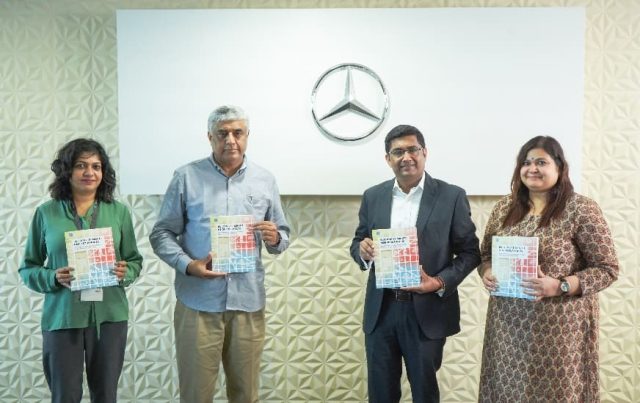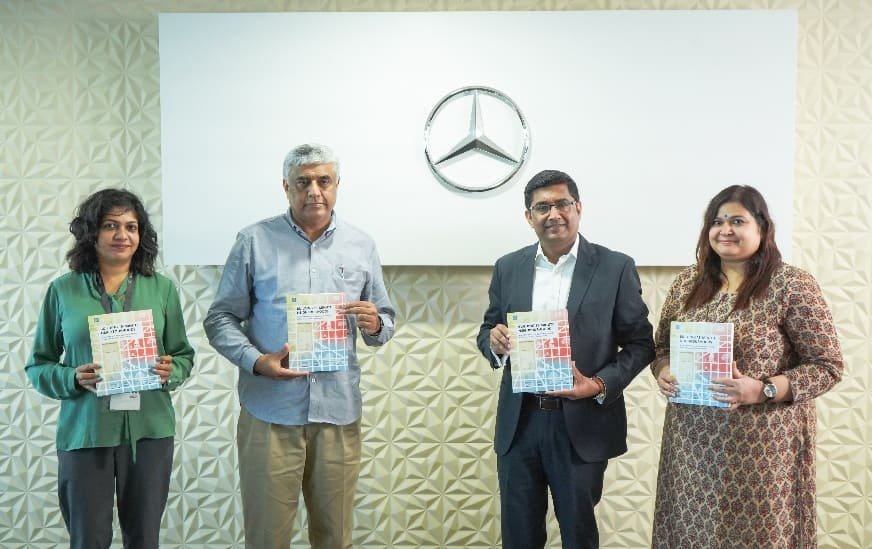
Bengaluru, India: Mercedes-Benz Research and Development India (MBRDI) has partnered with Jana Urban Space Foundation to unveil design guidelines for ‘Building 15-Minute Neighbourhoods’, addressing the need for sustainable urban planning in India. The guidelines along with an implementation toolkit highlight key strategies that cities can employ to facilitate a 15-minute neighbourhood, where most amenities are accessible within a 15-minute walk or cycle ride. This approach enhances the quality of life by promoting high-quality pedestrian and public transport systems, safe public spaces, and inclusive social infrastructure.
Neighbourhoods in India are diverse, characterised by a variety of population densities and socio-economic features. By emphasising on efficient spatial development and the mobility of people, the 15-minute neighbourhood concept represents a significant advancement from the current planning approach of retrofitting uncontrolled urban sprawl. It aims to enhance residents’ quality of life by ensuring daily needs are met within a 15-minute walk.
The guidelines have been developed following extensive research to evaluate existing services such as mobility infrastructure, public transport, and green spaces, with a focus on walkability, safety, and accessibility. This led to the ‘Move-Play-Sustain-Include’ framework, designed to foster integrated mobility and transport, safe public spaces, sustainable produce markets, and inclusive social infrastructure, all aimed at creating accessible and vibrant communities.
Prof. Rajeev Gowda, Former Member of Parliament and Former Vice Chairman of Karnataka State Policy and Planning Commission (KSPPC) said, “Accelerated industrialisation has led to issues like water crisis, landfill explosion, traffic control, and more. Proactive measures that foster collaboration and innovative solutions at the grassroots level are imperative to tackle these concerns. The ‘Building 15-Minute Neighbourhoods’ design guidelines and implementation toolkit represent a positive step towards creating more equitable and environmentally conscious cities, and we look forward to seeing this in action.”
As noted by Shri Rakesh Singh, IAS, Additional Chief Secretary of the Urban Development Department, Government of Karnataka, “Bengaluru, a city that has long been at the forefront of innovation and growth, also grapples with the perils of rapid urbanisation. The pressure of rapid development is felt in the city’s living conditions, in addition to its impact on the natural resources and ecology. Rather than relying on broad, one-size-fits-all approaches, it is crucial to tailor solutions to each neighbourhood’s unique needs and characteristics.”
Manu Saale, Managing Director and CEO, Mercedes-Benz Research and Development India said, “Sustainability is central to MBRDI’s commitment to enhance urban quality of life through innovative mobility and transport solutions. Our collaboration with Jana Urban Space Foundation empowers local communities to build self-sufficient neighbourhoods tailored to their unique needs and challenges. Through concerted action from all stakeholders, we can build more resilient cities and a sustainable future.”
Nithya Ramesh, Director, Jana Urban Space Foundation said, “For most people, their first memories of a city are tied to their street and neighbourhood before the city as a whole. In cities like Bengaluru, which has been navigating the gap between masterplans, there’s a unique opportunity to emphasise communities and neighbourhoods as foundational elements of urban development. This approach is central to our 15-minute neighbourhood programme, which aims to use communities as the building blocks for creating better cities, enhancing quality of life, and fostering a sense of belonging. Through the 15-minute neighbourhoods, we aim to bring back people into planning process.”
The guidelines feature cases of the studies and surveys conducted across four select neighbourhoods in Bengaluru – Whitefield, Malleswaram, Indiranagar, and Chickpete, to support the suggested strategies. As the project’s next phase, the pilot model will be developed for the Nallurhalli neighbourhood in Bengaluru.
Disclaimer: This media release is auto-generated. The CSR Journal is not responsible for the content.
Source link
Modified by Maaaty at Cheap Generic Pharmacy

